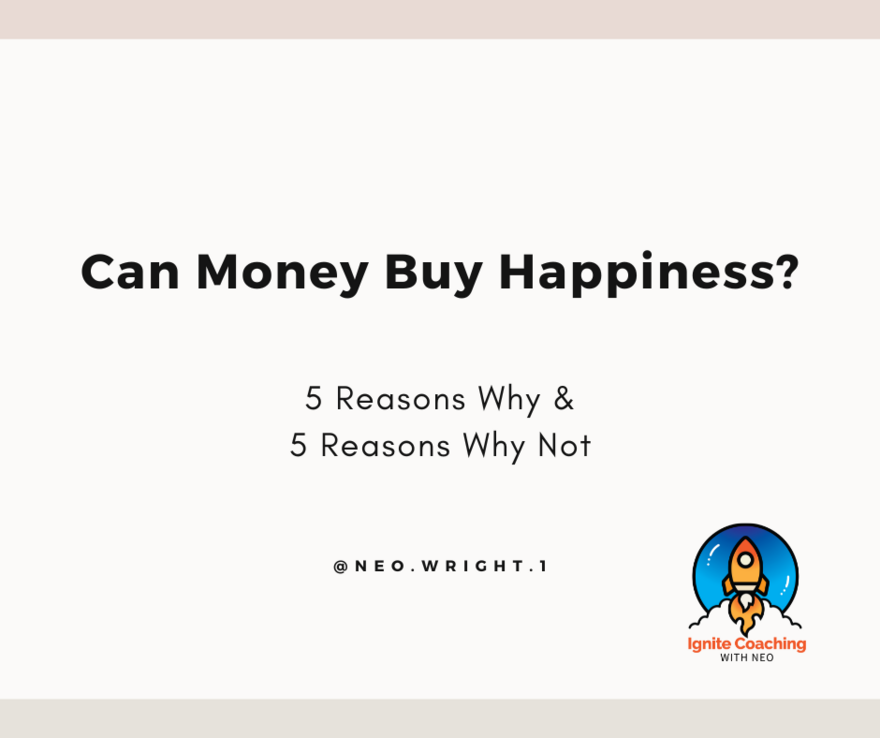Can Money Buy Entrepreneurs Happiness? 5 Reasons Why and Why Not

In the quest for success, entrepreneurs often grapple with the age-old question: Can money buy happiness? The topic is both a philosophical musing and a practical concern for those in the fast-paced world of entrepreneurship. There are valid points on both sides of the argument.
Why Money CAN Buy You Happiness
1. Means to Pursue Your Passions
For many entrepreneurs, money is a tool that unlocks freedom. Financial stability allows us to pursue our passions and invest in projects we truly believe in. This autonomy is a significant source of happiness and fulfillment, enabling entrepreneurs to start and expand their own businesses without the constraints of financial insecurity. This is also true for passion projects outside of our professional lives, including hobbies and philanthropy.
2. Access to Better Healthcare and Wellness Resources
Financial resources can significantly improve one's quality of life by providing access to better healthcare, nutritious foods, and wellness activities. With the increasing costs of living, even purchasing groceries to maintain a well-balanced diet is a small financial luxury. Entrepreneurs with financial wealth can afford to prioritize their physical and mental health, contributing to overall happiness and longevity.
3. Ability to Support and Give Back to Others
Money enables entrepreneurs to support our families, contribute to our communities, and invest in causes we care about. The ability to give back and positively impact the lives of others - especially our loved ones - brings a sense of satisfaction and purpose, enhancing one's own happiness in the process.
4. Security and Peace of Mind
Financial stability offers a sense of security that is fundamental to happiness. Entrepreneurs who have achieved financial success enjoy the peace of mind that comes with knowing they can weather financial storms, support their loved ones, and secure their futures. The decreased stress alone allows us to live happier lives.
5. Opportunities for Personal and Professional Growth
With financial resources, entrepreneurs can invest in personal and professional development, such as hiring life coaches or attending workshops, courses, and networking events that enrich their skills and knowledge. This ongoing growth and learning contribute to a fulfilling and happy life.
The Flip Side: Where Money Falls Short of Happiness
1. Diminishing Returns
Research suggests that beyond a certain point, increases in wealth have a diminishing return on happiness. Once basic needs are met, the additional satisfaction gained from more money decreases, indicating that happiness is not solely dependent on financial success.
2. Stress and Responsibility
With great wealth comes great responsibility. Entrepreneurs often face increased stress and pressure to maintain and grow their wealth, manage their businesses, and meet the expectations of stakeholders. This stress can overshadow the joys that financial success might bring.
3. Isolation and Misunderstanding
Financial success can sometimes lead to isolation or misunderstandings with friends and family who may have different financial situations. Entrepreneurs might find it challenging to relate to others who do not share their financial burdens or successes, potentially leading to feelings of loneliness and unhappiness.
4. Money Doesn’t Buy Love
Money, despite its capacity to provide comfort and security, falls short when it comes to purchasing love, a sentiment deeply rooted in emotional connections and mutual understanding rather than material wealth. Genuine love is built on the foundation of trust, respect, shared values, and the emotional investment of time and effort between individuals. It thrives on the intangible, often spontaneous acts of kindness and affection, rather than transactions or material possessions. Love, in its purest form, seeks no price and bears no tag; it cannot be bought, traded, or negotiated, for its essence lies in the unconditional acceptance and profound connection between human souls. Thus, while money can influence circumstances and opportunities for connection, it cannot create the deep, emotional bond that constitutes true love.
5. Happiness is Complex
Ultimately, happiness is a complex and deeply personal concept that cannot be bought or sold. It is influenced by a myriad of factors, including relationships, personal fulfillment, health, and sense of purpose. While money can influence these factors, it is not a guaranteed path to happiness.
Conclusion
For entrepreneurs, the relationship between money and happiness can be complicated. While financial success can provide the means to pursue our passions, improve our quality of life, and contribute to the well-being of others, it is not a panacea for all sources of unhappiness. Entrepreneurs must find a balance, seeking financial success while also nurturing the personal and emotional aspects of their lives that contribute to true happiness. Ultimately, the pursuit of happiness is a personal journey, one that includes our financial means in addition to other factors.

0 comments
Leave a comment
Please log in or register to post a comment